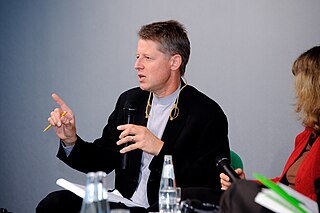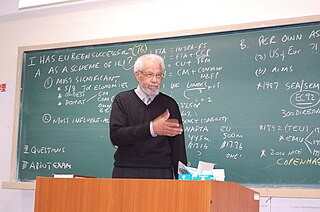
Martin Stuart Feldstein was an American economist. He was the George F. Baker Professor of Economics at Harvard University and the president emeritus of the National Bureau of Economic Research (NBER). He served as president and chief executive officer of the NBER from 1978 to 2008. From 1982 to 1984, Feldstein served as chairman of the Council of Economic Advisers and as chief economic advisor to President Ronald Reagan. Feldstein was also a member of the Washington-based financial advisory body the Group of Thirty from 2003.

The Erasmus Programme is a European Union (EU) student exchange programme established in 1987. Erasmus+, or Erasmus Plus, is the new programme combining all the EU's current schemes for education, training, youth and sport, the most recent programme covering the years 2021–27.
European studies is a field of study offered by many academic colleges and universities that focuses on the History of Western civilization and the evolution of Western culture, as well as on current developments in European integration.

Pan-European identity is the sense of personal identification with Europe, in a cultural or political sense. The concept is discussed in the context of European integration, historically in connection with hypothetical proposals, but since the formation of the European Union (EU) in the 1990s increasingly with regard to the project of ever-increasing federalisation of the EU. The model of a "pan-European" union is the Carolingian Empire, which first defined "Europe" as a cultural entity as the areas ruled by the Roman Catholic Church, later known as "Medieval Western Christendom". The original proposal for a Paneuropean Union was made in 1922 by Count Richard von Coudenhove-Kalergi, who defined the term "pan-European" as referring to this historical sense of the western and central parts of continental Europe encompassing the cultures that evolved from medieval Western Christendom instead of the modern geographic definition of the continent of Europe. Coudenhove-Kalergi saw the pan-European state as a future "fifth great power", in explicit opposition to the Soviet Union, "Asia", Great Britain and the United States.
John McCormick is Jean Monnet Chair of European Union Politics at Indiana University – Purdue University Indianapolis (IUPUI), and was department chair from 2001 until 2008. He spent eight years working in the environmental movement before becoming an academic. His research and teaching interests have moved from environmental policy to comparative politics and the politics and policies of the European Union.

Andrew Maitland Moravcsik is professor of politics and international affairs, director of the Liechtenstein Institute on Self-Determination, and founding director of both the European Union Program and the International Relations Faculty Colloquium at Princeton University.

Dame Helen Sarah Wallace, Lady Wallace of Saltaire, DBE, CMG, FBA, MAE, FAcSS, née Rushworth, is a British expert in European studies and, by marriage to William Wallace, Baron Wallace of Saltaire, a peeress. She was Foreign Secretary of the British Academy from 2011 to 2015.

The Notre Europe -Jacques Delors Institute, formerly Notre Europe, is an independent think tank based in Paris. Founded in 1996 by Jacques Delors, it aims to "think a united Europe." Enrico Letta currently serves as president of the Jacques Delors Institute, while Sylvie Matelly is its director.
James Clive-Matthews, better known as J Clive Matthews, is a British writer, editor, blogger and online content consultant. In 2008 he was shortlisted for the inaugural UACES-Reuters Reporting Europe Award, the only independent journalist on a five-person list that included the BBC's Europe Editor Mark Mardell and the Europe Editor of The Economist. In 2010 he was named winner of the "Internet" category in the European Parliament Prize for Journalism.
John O'Brennan is an Irish political scientist. He is a professor of European Politics at the Department of Sociology at Maynooth University in Ireland. He holds the Jean Monnet Chair in European Integration at Maynooth University and is director of the Maynooth University Centre for European and Eurasian Studies. From 2020 to 2023, the centre was a designated Jean Monnet Centre of Excellence, with a focus on governance in South-eastern Europe, including EU enlargement issues, rule of law and EU relations with the Western Balkans and Ukraine. O'Brennan is a specialist in EU enlargement policy and also publishes on Ireland's relationship with the European Union (EU).
Peter Nedergaard is a Danish professor of political science who has been employed at the Department of Political Science at the University of Copenhagen since 2008. Peter Nedergaard is member of the Order of Dannebrog.

David Rennie is a British journalist. He is a columnist for The Economist, where until September 2017 he served as the Lexington columnist and until 2024 as Beijing bureau chief and author of the Chaguan column on China. Currently he serves as The Economist's geopolitics editor. He is the son of Sir John Rennie, former 'C' of the Secret Intelligence Service (MI6).
Sophie Meunier is a senior research scholar in Public and International Affairs at Princeton University's School of Public and International Affairs. She is the Director of Princeton's Program in Contemporary European Politics and Society and the Co-director of the European Union Program at Princeton, which she founded with Andrew Moravcsik. She also served as Acting Director of the Liechtenstein Institute on Self-Determination at Princeton (2023-2024). She was elected Chair of the European Union Studies Association, the world's premier scholarly association for the study of the European Union and the process of European integration (2023-2024). A Franco-American political scientist, she is an expert in European integration, the politics of European trade and investment policy, and the politics of anti-Americanism. Meunier is a faculty fellow in Yeh College at Princeton University.
The Centre for Studies on Federalism (CSF) was established in November 2000 with the primary purpose of studying and researching the theory and practice of Federalism both as a political doctrine and in its implementation in the institutional systems of the Modern state. CSF's main focus is on the infra-national, macro-regional and global scale of federalism: it specifically considers regional integration at a time of globalisation, with special reference to Europe, its history and civilization, its progress towards unification and its future.
Fritz W. Scharpf is a German professor and Emeritus Director of the Max Planck Institute for the Study of Societies. His areas of interest include; the organisational problems and decision processes in governments at all levels; the political economy of inflation and unemployment; comparative political economy of the welfare state.

Ali M. El-Agraa is Emeritus Professor of International Economic Integration, Fukuoka University, Japan. He was invited to Fukuoka University in 1988 while he was a Visiting Professor with the International University of Japan (1984-6), on leave from the University of Leeds (UK), which he joined in 1971. He left Sudan in 1964 for England where he became a permanent resident and in 1977 was granted British citizenship. He is married to Diana Latham Moult and has a son and a daughter. He is now back in the UK, living in Greater London.

The JCMS: Journal of Common Market Studies is a bimonthly peer-reviewed academic journal covering the politics and economics of European integration, focusing principally on developments within the European Union, European politics more broadly and comparative regionalism (politics). It was established in 1962 and is published by John Wiley & Sons on behalf of UACES. The editors-in-chief are Toni Haastrup and Richard Whitman and the co-editors are Heather MacRae, Annick Masselot, Mills Soko and Alasdair R. Young.
Professor Richard G. Whitman is an academic, think tank member and media commentator focusing on the European Union's international role and the UK's foreign policy. He is professor of politics and international relations and a member of the Global Europe Centre at the University of Kent. He is also an associate fellow at Chatham House.
Wolfgang Theodor Wessels is a German political scientist. He holds the Jean Monnet Chair ad personam in political science, is a retired professor at the University of Cologne, and the head of the Centre for Turkey and European Studies (CETEUS) at the University of Cologne.

Loukas Tsoukalis is a Greek political economist and European public intellectual with a long experience in EU affairs. He is a Professor at the Paris School of International Affairs, Sciences Po, Emeritus Professor at the University of Athens, and President of the Board of the Hellenic Foundation for European and Foreign Policy (ELIAMEP).









